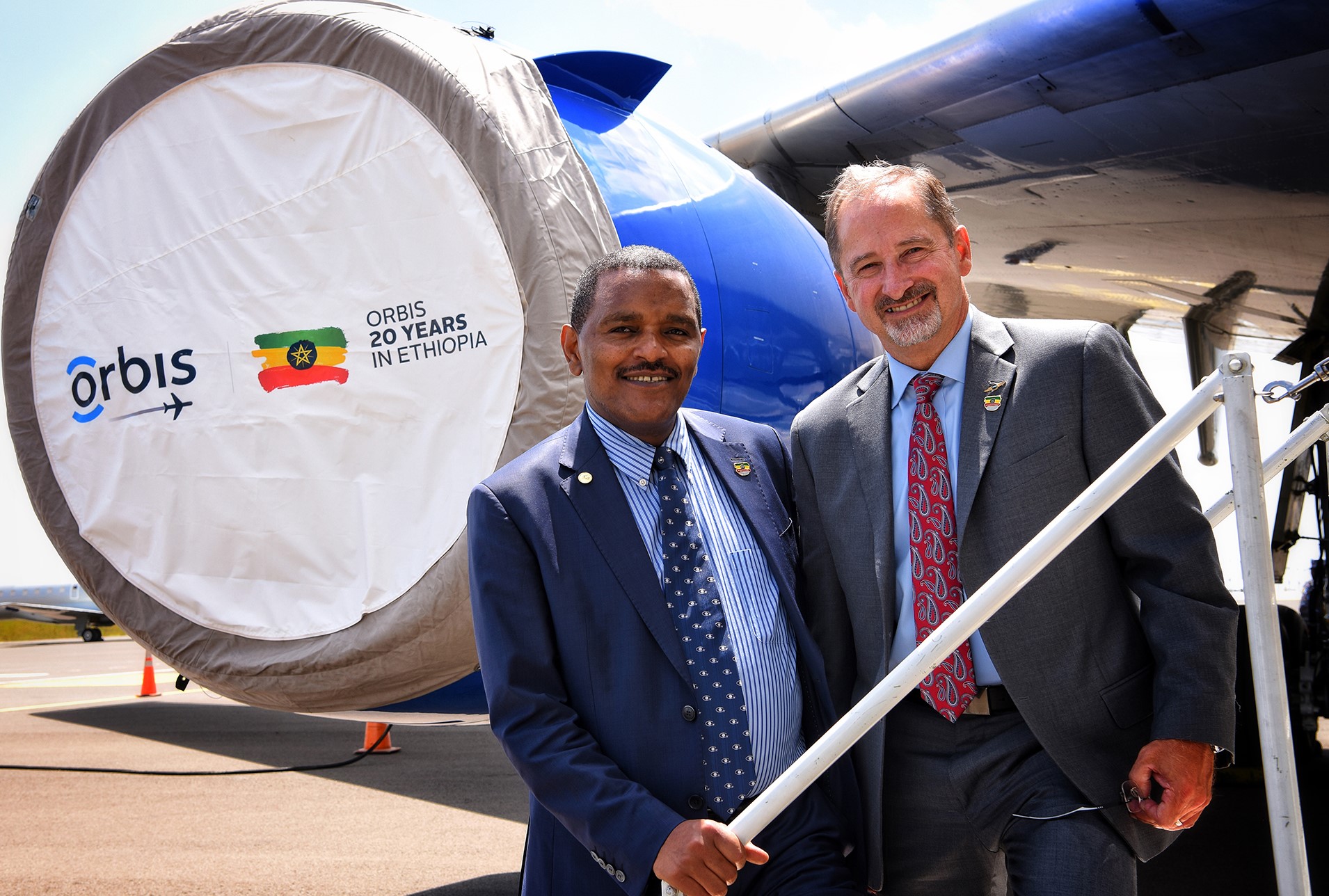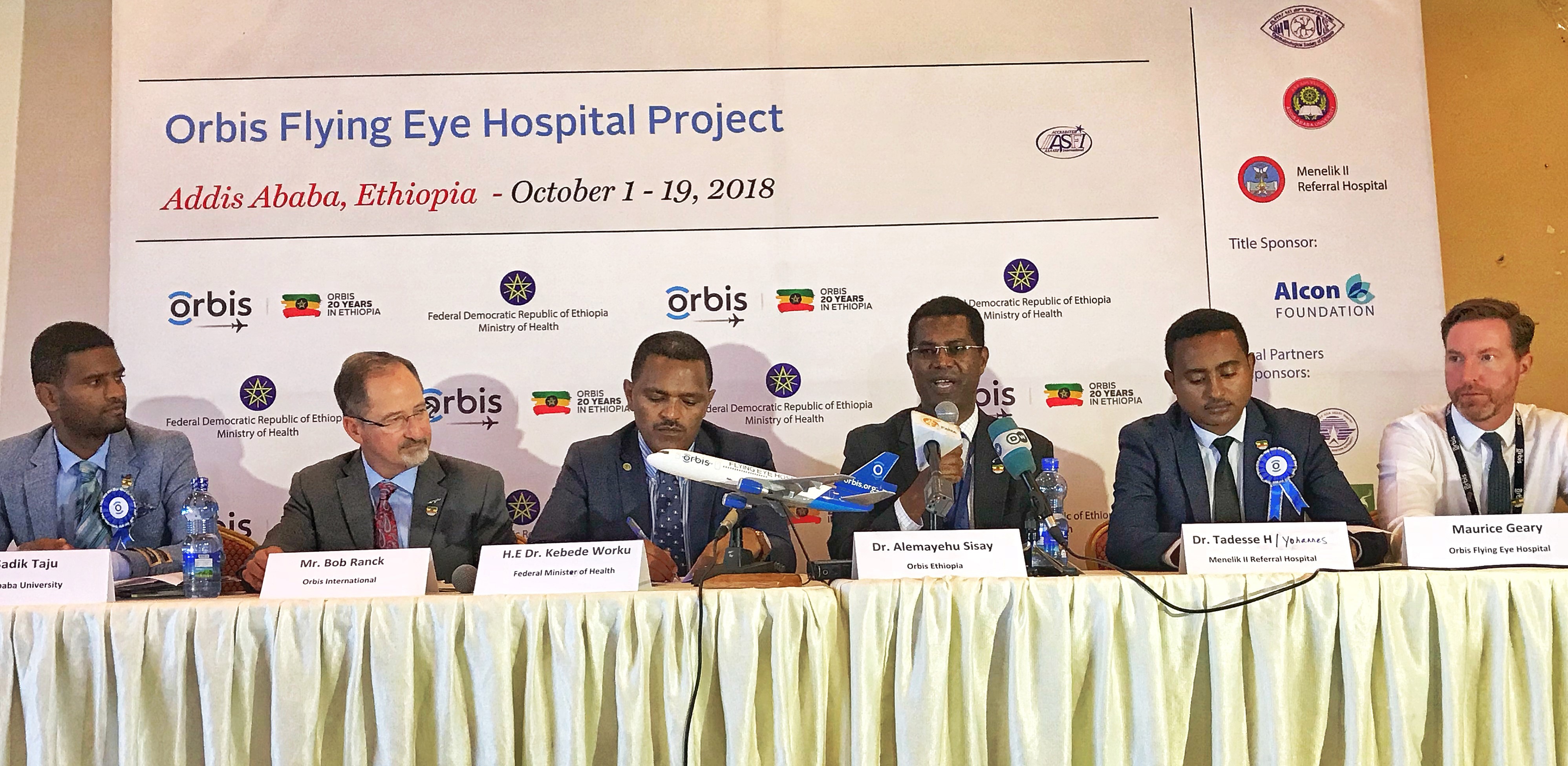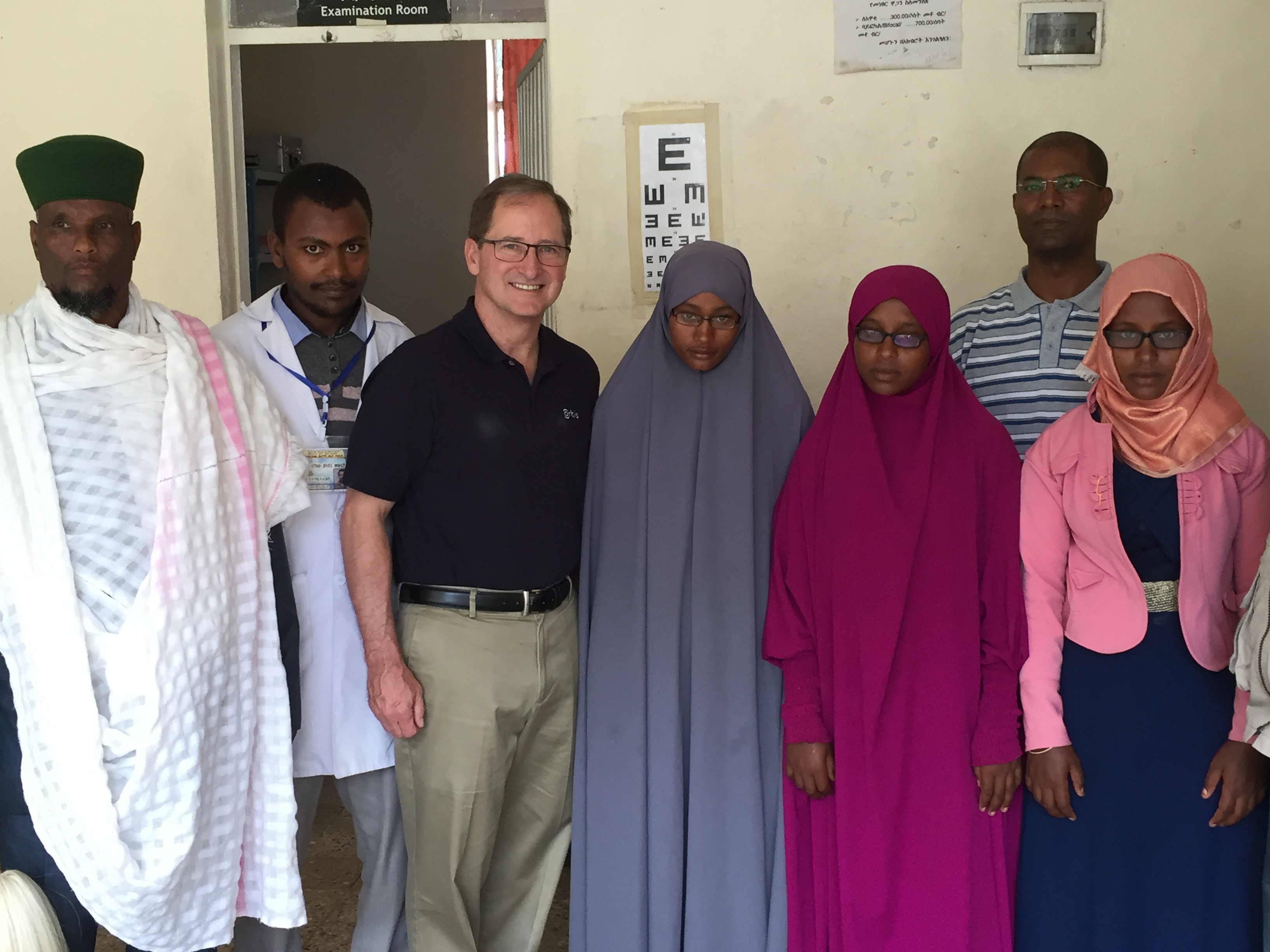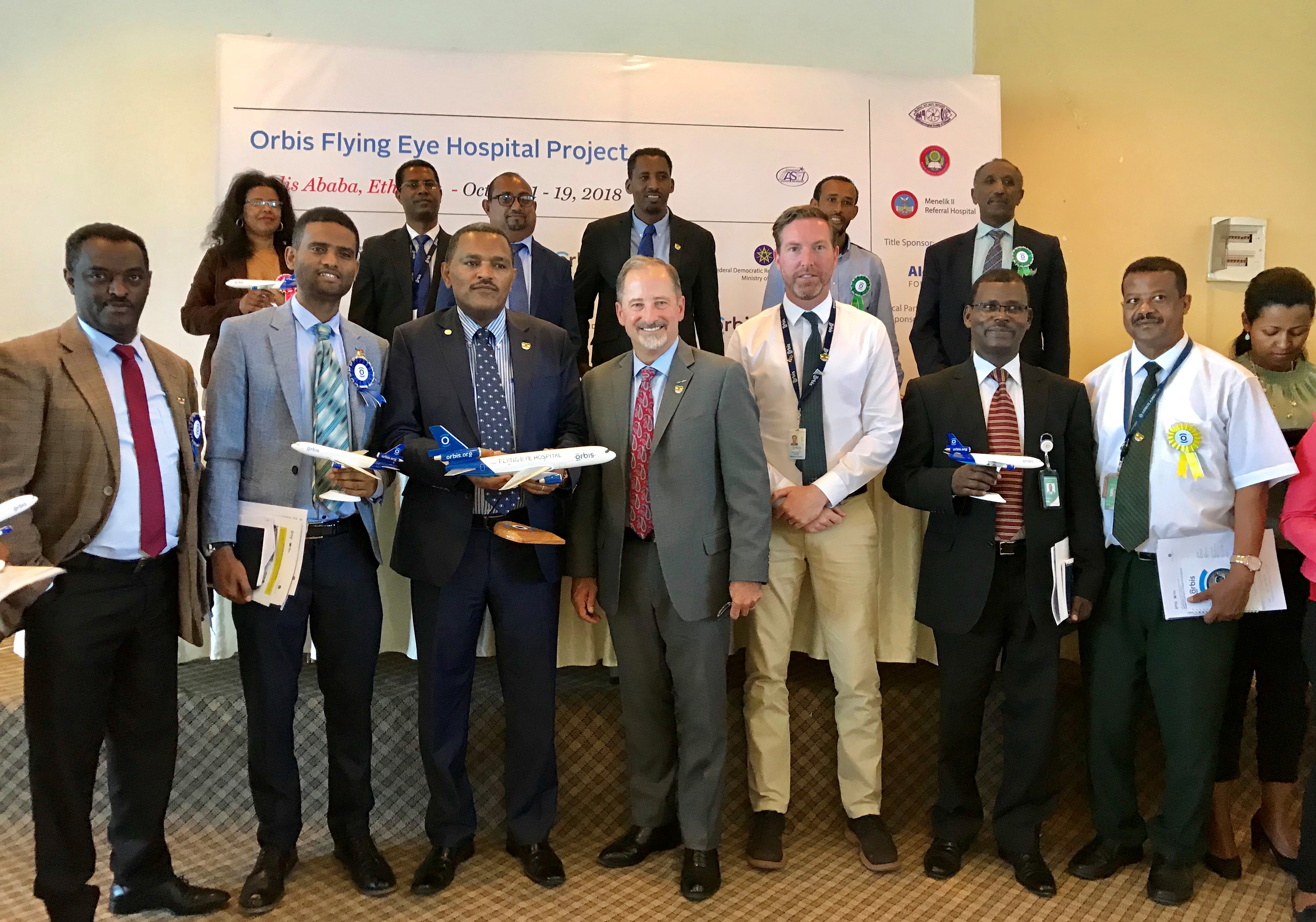During my first visit to an eye clinic in Ethiopia, I met a local Catholic priest who had lost vision in both eyes due to cataracts. He had not let the congregation know that he was losing his sight. Instead, he tried to cope as best he could. It wasn’t until he finally had to turn over his daily Bible reading to another parishioner that people began noticing changes. That same parishioner confronted the priest and informed him that the Orbis clinic nearby could help him.
While it took some convincing, he eventually had his vision completely restored through manual, small incision cataract surgery done by topnotch eye surgeons. The improvement was life changing for him and his community, as he could now resume his position of leadership. The day I met him, he read me a poem that he had written to thank Dr. Dereje, a local doctor, and Orbis for restoring his sight. Since the poem was in Amharic, I only understood “Dereje” and “Orbis”, but the fact that an entire community had been transformed by helping one leader was not lost on me.
 IN THE PHOTO: ORBIS EYE HOSPITAL OPENING PROGRAM PANEL OF EXPERTS. PHOTO CREDIT: ORBIS FLYING EYE HOSPITAL
IN THE PHOTO: ORBIS EYE HOSPITAL OPENING PROGRAM PANEL OF EXPERTS. PHOTO CREDIT: ORBIS FLYING EYE HOSPITAL
This type of impact doesn’t happen overnight. Orbis International, a non-profit working to transform lives through the prevention and treatment of blindness globally, has been working in Ethiopia for the past 20 years to change the way people see. Since 1998, Orbis has worked with local partners to train eye care professionals and strengthen health systems—from urban hospitals to rural eye clinics. Visiting Orbis clinics in Ethiopia was my first field exposure to Orbis programs as President and CEO, and frankly, I was not prepared for the depth of emotional impact I felt while being there.
According to AOS, the scale of the global problem is staggering. 253 million people in the world are visually impaired. Seventy five percent of visual impairment is actually avoidable through cost-effective treatment and prevention, but with 89 percent of those who are blind living in low-income settings, access to quality eye care is scarce.
ORBIS IN ETHIOPIA
When Orbis first started working in Ethiopia specifically, the population was around 65 million and had just around 54 ophthalmologists, most concentrated in the capital city of Addis Ababa. Ophthalmologists were also using outdated surgery techniques to treat cataracts, the leading cause of blindness in the country. They also had little to no educational opportunities to specialise in a specific area of ophthalmology, including pediatric training (an extremely relevant sub-speciality in a country where children under 15 make up 45 percent of the population).
Most jarring was the effect of trachoma—a painful, contagious bacterial infection of the eye that causes your eyelashes to turn inward, scratching your cornea, and leading to blindness. Eliminated in the U.S. in the 1970s, Ethiopia is home to 37.5 percent of the world’s trachoma cases. Controlling the disease requires the World Health Organisation-recommended SAFE strategy: Surgery, Antibiotics, Facial cleanliness, and Environmental change (access to clean water and sanitation infrastructure).
 IN THE PHOTO: BOB RANCK, ORBIS PRESIDENT & CEO, WITH ETHIOPIAN TEAM. PHOTO CREDIT: ORBIS FLYING EYE HOSPITAL
IN THE PHOTO: BOB RANCK, ORBIS PRESIDENT & CEO, WITH ETHIOPIAN TEAM. PHOTO CREDIT: ORBIS FLYING EYE HOSPITAL
I’m proud to say that Orbis is making a measurable difference in the fight against trachoma, and in developing the eye care infrastructure in Ethiopia. With our partners, and a dedicated group of volunteer doctors, we mentor, train and inspire local eye care teams so they can sustainably save sight within their communities, by focusing on the leading causes of visual impairment, advocacy, public awareness and operational research. This includes the introduction of modern cataract surgical techniques, training the country’s first generation of eye health sub-specialists, introducing pediatric eye health to the country, developing and launching an eye bank, and eliminating blinding trachoma. To date, we have distributed over 44.5 million doses of Zithromax, the antibiotic used to treat trachoma, and 24 districts in the country have reduced their active infection below the World Health Organisation’s threshold.
WHAT’S NEXT
With the help of partnering institutions, we have made huge strides over the past 20 years. However, non-profits operate in a changing environment. Issues are more complex and cut across more challenges and geography than ever before; however, this also creates opportunities for creative alliances. We have a real opportunity to fully eliminate blinding trachoma across Ethiopia, and give the same level of attention, care, and unique focus in the many other countries across Africa, Asia, South America and the Caribbean.
Global blindness is predicted to triple by 2050 due to our rapidly growing and ageing population, so we must find sustainable ways to scale up our efforts and amplify our impact to create real change. Here are just some of the ways in which we’re doing that in Ethiopia and around the world, keeping global frameworks such as the United Nations’ Sustainable Development Goals (SDGs) in mind:
1. Growing the number of qualified ophthalmologists means that we will be contributing to SDG3—Good Health and Well Being. Since 1998, we’ve helped grow the number of ophthalmologists in Ethiopia from 54 to 148. This means that more people have more access to more quality eye care. And we know that when people have good vision, they can be more productive members of society, helping to decrease poverty (SDG1) in their communities. But 148 ophthalmologists are not enough for Ethiopia. Plus, most ophthalmologists still work in urban areas, while 85 percent of the population lives in rural settings. The population now stands at 105 million, and over 1.6 million are still blind (another 3.8 million have low vision). At the same time, the World Health Organisation states that 87 percent of blindness and 91 percent of low vision in Ethiopia is treatable. We will invest in our clinical training and find innovative ways to use technology to teach and train the next generation of eye health specialists to make sure no one loses their sight to something preventable or treatable.
2. Increasing investment to speed up the elimination of blinding trachoma, which remains one of the leading causes of blindness and low vision in Ethiopia. Although three major regions in Ethiopia are 100 percent covered with SAFE interventions, only 70 percent of the Southern Nations, Nationalities, and Peoples’ Regional State, where we’re currently concentrating our efforts, is covered. Our focus on trachoma lays the foundation for primary eye care and setting up referral systems and increased access to speciality care for other eye diseases as well. The inclusion of the SAFE program in our comprehensive trachoma work means that we will be contributing to SDG6 – Clean Water and Sanitation. As our trachoma work accelerates, more people will have access to clean water.
3. Overcoming barriers to eye care for women and children. Fifty-five percent of all people who are blind are women. As an international development organisation, we need to address the unequal access to quality eye care, especially in the face of an exponential growth in blindness. SDG 5 – Gender Equality is a priority within blindness prevention, and our programs will continue to more greatly emphasise gender responsive strategies.
4. Leveraging technology and innovation to strengthen delivery of training. Orbis uses several tools to amplify impact, including the Flying Eye Hospital—the world’s only ophthalmic teaching hospital on-board an MD-10 aircraft—and Cyber-sight, our telemedicine platform for mentoring and training doctors around the world, especially in places we can’t reach in person. This usage of technology not only helps increase our reach, but is also proven to improve learning outcomes when combined with in-person training—fitting perfectly within SDG 4 – Quality Education.
5. Investing in strategic partnerships. Our work is always with and through local partners. Our 20-year-old tried and tested model in Ethiopia has led to better health, less poverty, more access to clean water, improved quality education, and developments in gender equality. We strive to fulfil the SDG promise of reaching the furthest behind first, and leaving no one behind. We will continue to strengthen our contribution to SDG17 – Partnership for the Goals.
 IN THE PHOTO: ORBIS CEO WITH SOME ETHIOPIAN’S PHYSICIST AND DOCTORS. PHOTO CREDIT: ORBIS FLYING EYE HOSPITAL
IN THE PHOTO: ORBIS CEO WITH SOME ETHIOPIAN’S PHYSICIST AND DOCTORS. PHOTO CREDIT: ORBIS FLYING EYE HOSPITAL
Looking ahead to the rest of this year and beyond, our vision in Ethiopia and in our wider Orbis work globally remains clear: transform lives so that no one faces a lifetime of blindness that could be prevented. As an international development organisation, we will continue to deepen our contribution to the Sustainable Development Goals. As a blindness prevention organisation, we can grow our impact by partnering with other NGOs, foundations and major supporters. And, as an organisation that helps others, we will continue to recruit others to do more good in our world.



 IN THE PHOTO: ORBIS EYE HOSPITAL OPENING PROGRAM
IN THE PHOTO: ORBIS EYE HOSPITAL OPENING PROGRAM  IN THE PHOTO: BOB RANCK, ORBIS PRESIDENT & CEO, WITH ETHIOPIAN TEAM. PHOTO CREDIT:
IN THE PHOTO: BOB RANCK, ORBIS PRESIDENT & CEO, WITH ETHIOPIAN TEAM. PHOTO CREDIT:  IN THE PHOTO: ORBIS CEO WITH SOME ETHIOPIAN’S PHYSICIST AND DOCTORS. PHOTO CREDIT:
IN THE PHOTO: ORBIS CEO WITH SOME ETHIOPIAN’S PHYSICIST AND DOCTORS. PHOTO CREDIT: 





